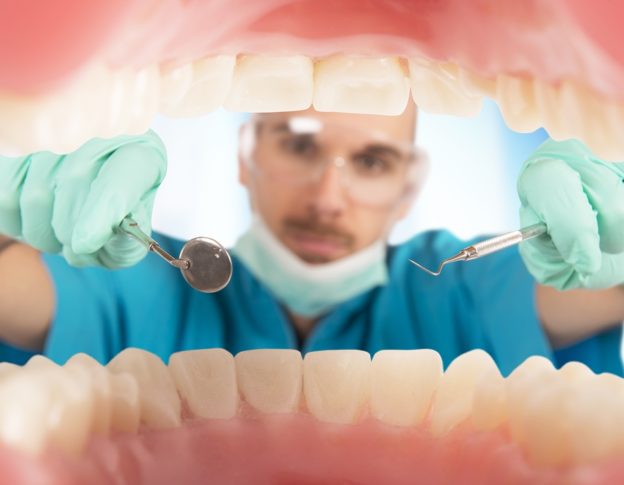By David Blyweiss, M.D., Advanced Natural Wellness
August 12, 2016
- Here’s where regular dental care falls short
- What’s good for your gut is good for your mouth
- Take dentures out of your future
Nobody wants to lose their teeth and end up with dentures.
So you brush, floss and rinse regularly to remove offensive bacteria that can rot your teeth and infect your gums. You probably also visit your dentist every six months for a professional cleaning.
But have you ever noticed that some people seem to be plagued with caps, crowns, root canals, gum disease and extractions… no matter how well they take care of their teeth?
There may be a relatively simple explanation for that.
You see, while brushing and flossing have always been the gold standard when it comes to dental care, there’s a flaw to this custom that most dentists never address.
What is it?
Open your arteries, improve blood flow for a new health miracle...
Did you know your circulatory system has over 60,000 miles of arteries, veins and other blood vessels, if stretched end to end?
But as you age, your blood vessels undergo changes, which may cause them to stiffen, thicken and get clogged.
GOOD NEWS! Doctors have now identified a “Miracle Molecule” inside your arteries that helps OPEN your arteries and IMPROVE blood flow.
It’s what Dr. Valentin Fuster calls it, "One of the most important discoveries in the history of cardiovascular medicine."To you, that means...
- Healthy blood pressure
- Sharper mind and memory
- Skyrocketing energy and muscular strength
- Increased pleasure and passion in the bedroom
- Improved circulation to every cell and organ in your body
Go here to discover a new natural way to significantly boost the levels of this miracle molecule in YOUR body NOW!
Well, when you diligently remove all the “bad” bacteria in your mouth, you actually create an environment that also allows it to flourish.
That’s because you aren’t just stripping your mouth of unhealthy microbes. You’re also wiping out all of the good bacteria that protect your teeth from these same dental problems. And without these protective microbes, it gives tooth-decaying bacteria a chance to gain a foothold. (As an aside, when you frequently use strong antimicrobial mouthwash you unbalance the microbial ecosystem which aids in nitric oxide formation for your cardiovascular system.)
Thankfully, science has finally come around to understanding that this is a problem that needs to be addressed.
Here’s Where Regular Dental Care Falls Short
Bacteria that harm your dental health form biofilm colonies that you know as plaque. It’s that soft, sticky stuff that builds up on your teeth. And it tends to collect in areas that are hard to get to with a toothbrush alone – like between the teeth and gums, and in the areas between teeth.
This is why we floss and rinse after brushing.
But even that doesn’t remove all of the bacteria-laden plaque hiding in those crevices. And these areas are the ones that cause the most problem.
When “bad” microbes migrate to these nooks and crannies, they don’t just cause tooth decays and gum disease. They’re also linked to the development of heart disease, diabetes, dementia and rheumatoid arthritis.
Are You Suffering From...
- Love handles and a pot belly
- Romance that isn't what it used to
- Forgetfulness and inattention
- Low (or no) strength and endurance
- A sex drive that's shifted into neutral...or worse
If so...you may have Mature Male Burnout. Click here to discover more about this unique condition and what you can do about it.
And unless you can re-establish a healthy balance of beneficial flora in your mouth, you’ll never be able to get the upper hand.
Thankfully, there’s an easy way to do that. Simply flood your mouth with an army of “good guys” too help fight off the bad ones.
What’s Good for Your Gut is Good for Your Mouth
When you think of probiotics, you probably think of your digestive health. But your gut isn’t the only place these friendly bugs can influence your well-being.
Replenishing your oral flora with probiotics works in much the same way, and why wouldn’t it since your GI tract begins at the mouth. They replace disease-causing bacteria with the good kind. This creates an oral environment that resists colonization of bad bacteria.
Thus far, certain strains of lactobacilli have the most research behind them.
These include L. reuteri, L. acidophilus, L. bacillus and L. brevis. They not only reduce the number of bacteria that cause tooth decay. These strains can also help you avoid – and recover from – tissue problems like bleeding gums, gingivitis and periodontal disease.
Your best bet: Find an oral probiotic that combines a mix of these of these organisms. You can find them in many different forms… gum, lozenges or sublingual pills….or even letting a chewable dissolve in your mouth.
For the most beneficial results, use the probiotic immediately after brushing. This means your new brushing routine (twice a day) should be as follows:
Brush your teeth for two minutes at morning and night with fluoride-free toothpaste. Before you finish up, give your tongue a good brushing, too.
Floss right after brushing to remove any hidden debris. (Never floss before you brush or you’ll end up pushing bacteria down into your gums.)
Rinse with a mouthwash that’s fluoride, alcohol and sugar free.
Water Piking: I’ve begun to use this after brushing and flossing and am amazed at what I’m missing in an attempt to improve my oral health.
Take your oral probiotic. Unless it’s gum, don’t chew it. Just take your time and let the pill or lozenge dissolve of its own accord.
Even if your mouth is filled with caps, crowns and fillings, it doesn’t mean you’re destined for dentures. As comedian Soupy Sales once said: “Be true to your teeth… and they won’t be false to you.”
SOURCES:
Dewhirst FE, et al. The Human Oral Microbiome. J. Bacteriol. 2010;192:195002-5017
Marsh PD. Role of the Oral Microflora in Health. Microbial Ecology in Health and Disease 2000; 12: 130–137
Haukioja A. Probiotics and Oral Health. Eur J Dent. 2010 Jul; 4(3): 348–355.
Krasse P, et al. Decreased gum bleeding and reduced gingivitis by the probiotic Lactobacillus reuteri. Swed Dent J. 2006;30:55–60
Riccia DN, et al. Anti-inflammatory effects of Lactobacillus brevis (CD2) on periodontal disease. Oral Dis. 2007;13:







